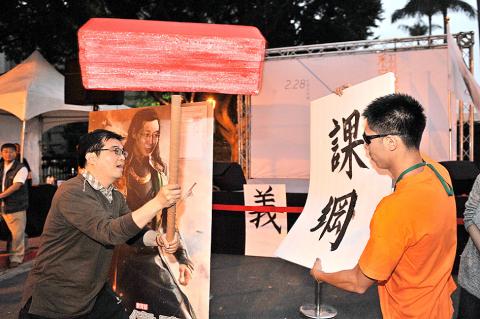The Taipei High Administrative Court on Thursday ruled against the Ministry of Education in a case involving the ministry’s controversial “minor adjustments” to high-school curriculum guidelines.
The court said the ministry should make its information more transparent and complete for public perusal.
The “minor adjustments” made to the guidelines for history, civic and social studies, Chinese and geography in January last year sparked controversy, leading to protests by civic groups, high-school teachers and academics — who called the changes “de-Taiwanization and Sinicization” of the education system tailored to the Chinese Nationalist Party’s (KMT) view of history — and prompted the Taiwan Association of Human Rights to bring the case to court.

Photo: Liu Hsin-de, Taipei Times
Examples of the contentious changes to the history curriculum included revising the term “Japanese-governed period” to “Japanese occupation period,” and naming the period during which Koxinga, also known as Cheng Cheng-kung (鄭成功), ruled Taiwan in the 17th century the “Ming Cheng period,” with “Ming” signifying China’s Ming Dynasty, despite the Ming not, in official terms, claiming sovereignty over the island, the groups said soon after the changes were announced.
The Taiwan Association of Human Rights filed an administrative lawsuit against the ministry in October last year after its administrative appeal, filed in March, was rejected.
The association said that even before the appeal, it had asked the ministry and the National Academy for Educational Research for information related to a resolution to adjust the curriculum, including a complete list of the review members, complete meeting minutes and ballot results.
The two agencies denied the request and simply offered abridged meeting records that “concealed key decisionmaking processes,” the association said.
According to Article 9 of the Freedom of Government Information Act (政府資訊公開法), individuals “may request government agencies to provide government information,” which means people have the right to request information related to the curriculum outline changes because it “is a national policy that concerns people’s rights to education,” it said.
“The Ministry of Education has repeatedly said that information about the changes should not be made public, which is brazenly against rights protected by the law and made us wonder whether its reluctance has something to do with its flawed decisionmaking process,” the association said.
The court’s ruling has safeguarded the public’s right to know and up held democracy, the association said, while calling on the ministry to immediately make public the information it has withheld and not appeal the ruling.
Minister of Education Wu Se-hwa (吳思華) yesterday said that the information was not entirely transparent due to concerns over the possibility that personal information could be leaked, adding that a new review process would be more thorough once put in place.
He said that the ruling would not affect the rollout of the curriculum adjustments this year, adding that the ministry would discuss with the National Academy for Educational Research about whether to file an appeal.
Additional reporting by Wu Po-hsuan

People can preregister to receive their NT$10,000 (US$325) cash distributed from the central government on Nov. 5 after President William Lai (賴清德) yesterday signed the Special Budget for Strengthening Economic, Social and National Security Resilience, the Executive Yuan told a news conference last night. The special budget, passed by the Legislative Yuan on Friday last week with a cash handout budget of NT$236 billion, was officially submitted to the Executive Yuan and the Presidential Office yesterday afternoon. People can register through the official Web site at https://10000.gov.tw to have the funds deposited into their bank accounts, withdraw the funds at automated teller

PEACE AND STABILITY: Maintaining the cross-strait ‘status quo’ has long been the government’s position, the Ministry of Foreign Affairs said Taiwan is committed to maintaining the cross-strait “status quo” and seeks no escalation of tensions, the Ministry of Foreign Affairs (MOFA) said yesterday, rebutting a Time magazine opinion piece that described President William Lai (賴清德) as a “reckless leader.” The article, titled “The US Must Beware of Taiwan’s Reckless Leader,” was written by Lyle Goldstein, director of the Asia Program at the Washington-based Defense Priorities think tank. Goldstein wrote that Taiwan is “the world’s most dangerous flashpoint” amid ongoing conflicts in the Middle East and Russia’s invasion of Ukraine. He said that the situation in the Taiwan Strait has become less stable

FRESH LOOK: A committee would gather expert and public input on the themes and visual motifs that would appear on the notes, the central bank governor said The central bank has launched a comprehensive redesign of New Taiwan dollar banknotes to enhance anti-counterfeiting measures, improve accessibility and align the bills with global sustainability standards, Governor Yang Chin-long (楊金龍) told a meeting of the legislature’s Finance Committee yesterday. The overhaul would affect all five denominations — NT$100, NT$200, NT$500, NT$1,000 and NT$2,000 notes — but not coins, Yang said. It would be the first major update to the banknotes in 24 years, as the current series, introduced in 2001, has remained in circulation amid rapid advances in printing technology and security standards. “Updating the notes is essential to safeguard the integrity

REASSURANCE: The US said Taiwan’s interests would not be harmed during the talk and that it remains steadfast in its support for the nation, the foreign minister said US President Donald Trump on Friday said he would bring up Taiwan with Chinese President Xi Jinping (習近平) during a meeting on the sidelines of the APEC Summit in South Korea this week. “I will be talking about Taiwan [with Xi],” Trump told reporters before he departed for his trip to Asia, adding that he had “a lot of respect for Taiwan.” “We have a lot to talk about with President Xi, and he has a lot to talk about with us. I think we’ll have a good meeting,” Trump said. Taiwan has long been a contentious issue between the US and China.